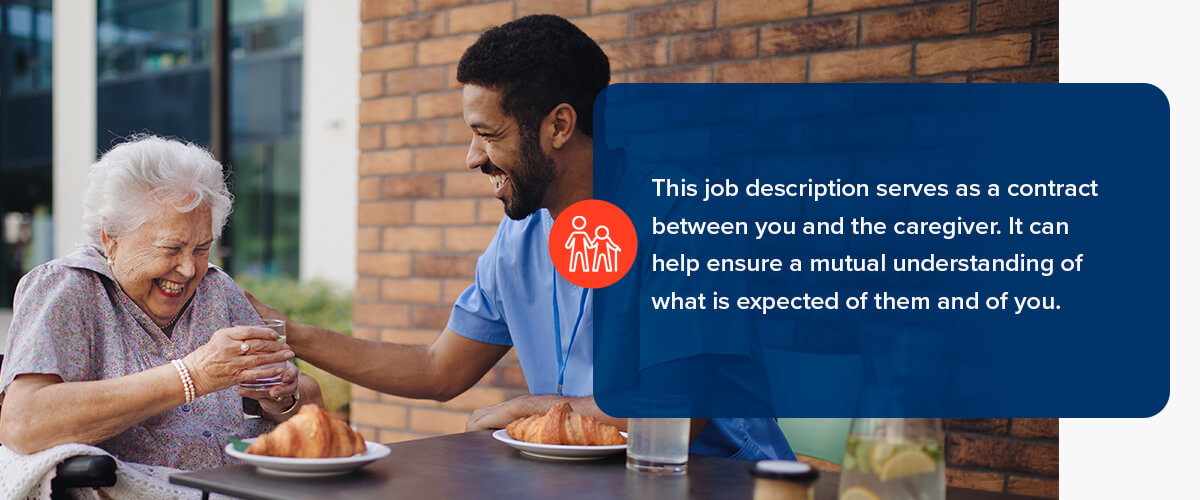When a loved one needs care and support, providing it all on your own can be difficult. That’s why hiring a caregiver can be incredibly helpful. A caregiver can assist with daily living activities, medication reminders, transportation and companionship, among other things. The goal is to find the right caregiver for your loved one’s specific needs and your family’s unique situation.
What Are a Caregiver’s Duties?
As you start the process of hiring a caregiver, it’s essential to understand the general duties a caregiver can provide. These duties vary depending on the caregiver and their agency, as well as the recipient’s specific needs.
Some general caregiver duties to consider when hiring include:
- Assistance: Caregivers should provide assistance with some or many daily living activities, such as grooming, dressing and toileting.
- Mobility: You or your loved one might require mobility and transferring assistance, such as help getting in and out of bed or moving around the house.
- Medication: Some caregivers can assist with medication, such as delivering medication reminders.
- Meals: Some adults need an extra hand when grocery shopping or preparing meals and may assist with feeding, if necessary.
- Cleaning: Some caregivers may perform light housekeeping duties, such as tidying up, doing laundry and washing dishes.
- Transport: Consider if you or your loved one require transportation to appointments and other activities outside the home.
- Companionship: Caregivers can provide companionship and emotional support, such as engaging in conversation, playing games or going for walks together.
- Monitoring: Caregivers are an excellent resource to monitor and report changes in a care recipient’s physical or mental health to their health care provider or family members.
Some caregivers with appropriate qualifications might also administer medications or help with bathing. It’s essential to keep in mind that these duties may vary depending on the recipient’s specific needs and the caregiver’s qualifications, so it’s crucial to have open communication with the caregiver and establish clear expectations and boundaries.
How Should I Write a Caregiver Job Description?
When hiring a caregiver, write a clear job description outlining the specific duties and responsibilities the caregiver will be expected to perform. This job description serves as a contract between you and the caregiver. It can help ensure a mutual understanding of what is expected of them and of you.
A clear job description can also attract suitable candidates for the position. By providing a detailed description of the care recipient’s needs and the specific duties the caregiver will be responsible for, you can help ensure that only those who are qualified and interested in the position will apply. This can save you time and effort in the hiring process and can also help ensure that the caregiver you hire is a good fit for your loved one’s needs and your family’s situation.
In addition to outlining the specific duties and responsibilities of the caregiver, a job description should also include information about qualifications, experience and any necessary certifications or licenses. It should also provide details about scheduling and availability, pay and benefits and any other meaningful considerations specific to your loved one’s care.
What to Consider When Hiring a Caregiver
Here are some tips to keep in mind and what qualities you should look for in a quality caregiver:
Consider the Care Recipient’s Needs
Before beginning the hiring process, assess the care recipient’s needs and determine what kind of care and support they require. This can help you create a clear job description and find a caregiver with the necessary skills and experience to provide the appropriate care.
Look for Qualifications and Experience
When reviewing applications and conducting interviews, be sure to ask about the caregiver’s qualifications and experience. Look for certifications or licenses that may be required for the care your loved one needs and ask about any relevant caregiver experience.
Check References and Conduct Background Checks
Before hiring a caregiver, be sure to check their references and conduct background checks to ensure they have a good track record of providing quality care. This can help give you peace of mind and ensure your loved one is safe and well-cared for.
Consider Compatibility and Personality Fit
Find a caregiver who is qualified and experienced but also a good fit for your loved one and your family’s personalities and unique situation, such as cultural or religious considerations. Look for factors such as a compatible communication style and the caregiver’s availability when hiring.
Establish Clear Expectations and Boundaries
Once you’ve hired a caregiver, establish clear expectations and boundaries to ensure everyone is on the same page. This can include setting schedules, outlining specific duties and responsibilities and discussing communication protocols.
10 Questions to Ask During the Interview Process
Figuring out what questions to ask can be challenging when interviewing potential caregivers. Your goal is to find someone qualified, experienced and a good fit for your loved one’s needs. Here are some questions to consider asking:
- What experience do you have providing care for someone with similar needs to my loved one?
- Are you comfortable with the specific tasks and responsibilities outlined in the job description?
- What kind of training or certifications do you have related to caregiving?
- How do you approach challenging or difficult situations that may arise when providing care?
- What is your approach to communication with the care recipient, family members and health care providers?
- How do you handle emergencies or unexpected situations?
- What kind of availability do you have, and can you work the necessary schedule to provide the care needed?
- What kind of support or resources do you have access to in order to provide the best possible care?
- Are you willing to undergo a background check and provide references?
- What kind of compensation and benefits are you looking for in this position?
By asking these types of questions, you can better understand a potential caregiver’s qualifications, experience and approach to providing care.
Getting a Compassionate, Innovative Home Care Service
Seeking a caregiver service can provide many benefits for both the care recipient and their family members. Open Arms Home Care is a caregiver service that provides high-quality care and support to seniors and adults with disabilities.
Here are some of the benefits of getting a caregiver service:
- Professional Care: With a caregiver service like Open Arms Home Care, you can rest assured your loved one receives professional and high-quality care.
- Customized Care Plans: Every care recipient has unique needs and preferences, and a caregiver service can provide customized care plans to meet those needs.
- Peace of Mind: Hiring a caregiver service can provide peace of mind for family members who cannot provide the necessary care and support themselves.
- Companionship and Socialization: Caregiver services also provide companionship and socialization to care recipients. This can be especially significant for seniors who may be isolated or lonely and can help improve their overall well-being.
- Flexibility: Caregiver services offer flexible care schedules to meet the needs of both the care recipient and their family members. This may include part-time, full-time or 24-hour care.
Families can ensure their loved one receives professional and high-quality care customized to their unique needs and preferences by choosing a caregiver service. This can provide peace of mind to support the care recipient and their family members’ well-being.
Talk with our professional team to see how we can offer personalized care for your loved one!







